新概念英语第二册(第一课)课文详细讲解
英语语法经典讲解 新概念英语二册 第一课

N oble English诺博英语语法经典讲解Lesson One A Private Conversationst week I went to the theater.Go to 后面加上主语所要去的场所来代表主语的动作目的。
但是有些短语中名词前通常不加冠词the 或a .go to the theater / show / cinema 去看戏/看演出/看电影go to the bank / post office 去银行干…业务/去邮局寄信等go to school / bed / church 上学/上床,睡觉/上教堂,去做礼拜go to the + 人+ ‟s表示去在这个人开的店:go to the doctor‟s / the butcher‟s 买肉/去看病2.I did not enjoy it.Enjoy意为欣赏、享受、喜爱,后面一般跟名词,代词(包括反身代词)或动名词。
enjoy doing sth. / sth. 喜欢做…(从中得到一种享受)enjoy oneself玩的开心a. ---Do you enjoy my teaching?你喜欢我的课吗?---Yes, I enjoy it very much. 是的,我很喜欢。
b. My mother enjoys watching TV.c. Learning English is really fun. I‟m really enjoying myself at the moment.3.I got very angry.Get在这里有“逐渐变得”的含义,接近become, 表示状态变化的过程,但是I was very angry则表示当时的状态是很生气,并不表示变化的过程。
a.The boys were getting bored. 孩子们开始有些厌烦了。
b.I was getting quite hungry. 我实在有些饿了。
新概念英语第二册第一课课文详解
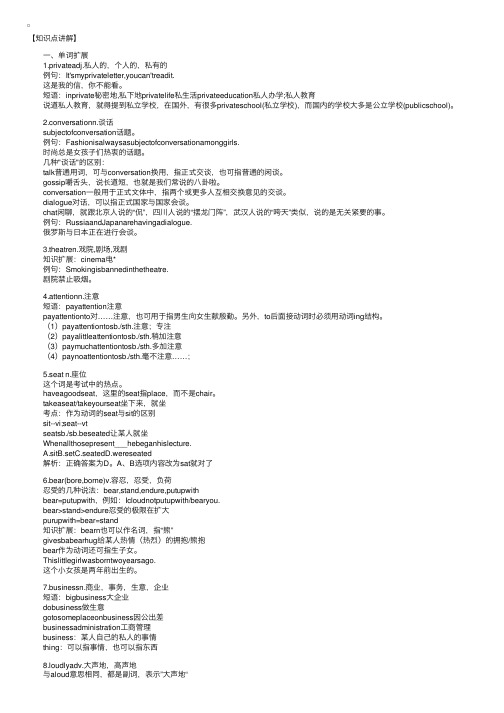
【知识点讲解】 ⼀、单词扩展 1.privateadj.私⼈的,个⼈的,私有的 例句:It'smyprivateletter,youcan'treadit. 这是我的信,你不能看。
短语:inprivate秘密地,私下地privatelife私⽣活privateeducation私⼈办学;私⼈教育 说道私⼈教育,就得提到私⽴学校,在国外,有很多privateschool(私⽴学校),⽽国内的学校⼤多是公⽴学校(publicschool)。
2.conversationn.谈话 subjectofconversation话题。
例句:Fashionisalwaysasubjectofconversationamonggirls. 时尚总是⼥孩⼦们热衷的话题。
⼏种"谈话"的区别: talk普通⽤词,可与conversation换⽤,指正式交谈,也可指普通的闲谈。
gossip嚼⾆头,说长道短,也就是我们常说的⼋卦啦。
conversation⼀般⽤于正式⽂体中,指两个或更多⼈互相交换意见的交谈。
dialogue对话,可以指正式国家与国家会谈。
chat闲聊,就跟北京⼈说的“侃”,四川⼈说的“摆龙门阵”,武汉⼈说的“咵天”类似,说的是⽆关紧要的事。
例句:RussiaandJapanarehavingadialogue. 俄罗斯与⽇本正在进⾏会谈。
3.theatren.戏院,剧场,戏剧 知识扩展:cinema电* 例句:Smokingisbannedinthetheatre. 剧院禁⽌吸烟。
4.attentionn.注意 短语:payattention注意 payattentionto对……注意,也可⽤于指男⽣向⼥⽣献殷勤。
另外,to后⾯接动词时必须⽤动词ing结构。
(1)payattentiontosb./sth.注意;专注 (2)payalittleattentiontosb./sth.稍加注意 (3)paymuchattentiontosb./sth.多加注意 (4)paynoattentiontosb./sth.毫不注意……; 5.seat n.座位 这个词是考试中的热点。
新概念英语第二册第一课课文及翻译
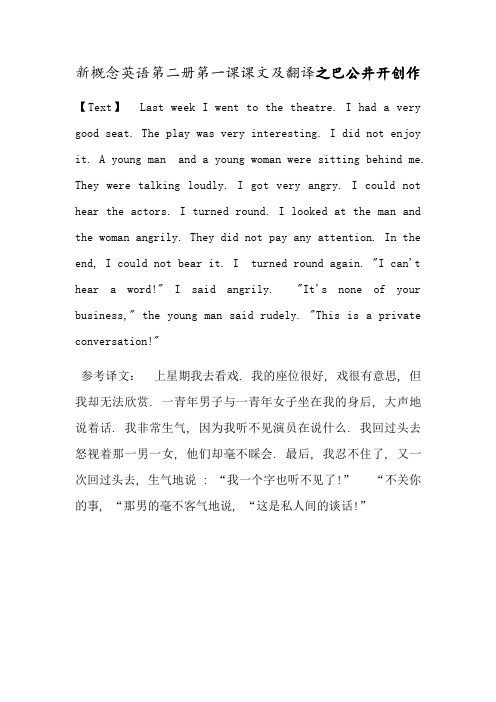
新概念英语第二册第一课课文及翻译之巴公井开创作【Text】 Last week I went to the theatre. I had a very good seat. The play was very interesting. I did not enjoy it. A young man and a young woman were sitting behind me. They were talking loudly. I got very angry. I could not hear the actors. I turned round. I looked at the man and the woman angrily. They did not pay any attention. In the end, I could not bear it. I turned round again. "I can't hear a word!" I said angrily. "It's none of your business," the young man said rudely. "This is a private conversation!"
参考译文:上星期我去看戏. 我的座位很好, 戏很有意思, 但我却无法欣赏. 一青年男子与一青年女子坐在我的身后, 大声地说着话. 我非常生气, 因为我听不见演员在说什么. 我回过头去怒视着那一男一女, 他们却毫不睬会. 最后, 我忍不住了, 又一次回过头去, 生气地说: “我一个字也听不见了!” “不关你的事, “那男的毫不客气地说, “这是私人间的谈话!”。
新概念英语第二册第一课(包含课文、练习及)
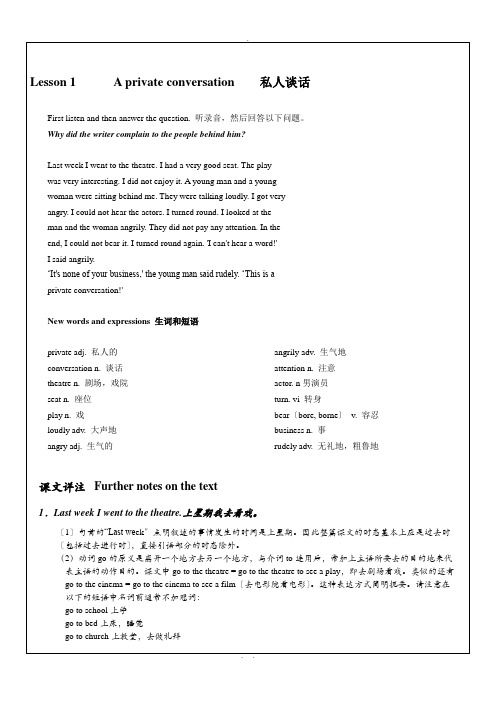
were sitting过去进行时,交待故事发生的背景
e.g. One night, I was reading in my study, suddenly a man broke into my house.
pay great attention to非常注意
man and the woman angrily. They did not pay any attention. In the
end, I could not bear it. I turned round again. 'I can't hear a word!'
I said angrily.
10.They did notpay any attention.他们却毫不理会.
attention n.注意
e.g. Attention, please!
Ladies and gentlemen, may I have your attention, please?
pay attention to对……注意
表主语的动作目的。课文中go to the theatre = go to the theatre to see a play,即去剧场看戏。类似的还有
go to the cinema = go to the cinema to see a film〔去电影院看电影〕。这种表达方式简明扼要。请注意在
I couldn't hear you clearly./I couldn't catch your words.
新概念英语第二册第一课课文及翻译

新概念英语第二册第一课课文及翻译
【Text】Last week I went to the theatre. I had a very good seat. The play was very interesting. I did not enjoy it. A young man and a young woman were sitting behind me. They were talking loudly. I got very angry.
I could not hear the actors. I turned round. I looked at the man and the woman angrily. They did not pay any attention. In the end, I could not bear it. I turned round again. "I can't hear a word!" I said angrily. "It's none of your business," the young man said rudely. "This is a private conversation!"
参考译文:上星期我去看戏. 我的座位很好, 戏很有意思, 但我却无法欣赏. 一青年男子与一青年女子坐在我的身后, 大声地说着话. 我非常生气, 因为我听不见演员在说什么. 我回过头去怒视着那一男一女, 他们却毫不理会. 最后, 我忍不住了, 又一次回过头去, 生气地说: “我一个字也听不见了!”“不关你的事, “那男的毫不客气地说, “这是私人间的谈话!”。
II-01新概念英语第二册,第一课课文讲解,自学导读,练习详解
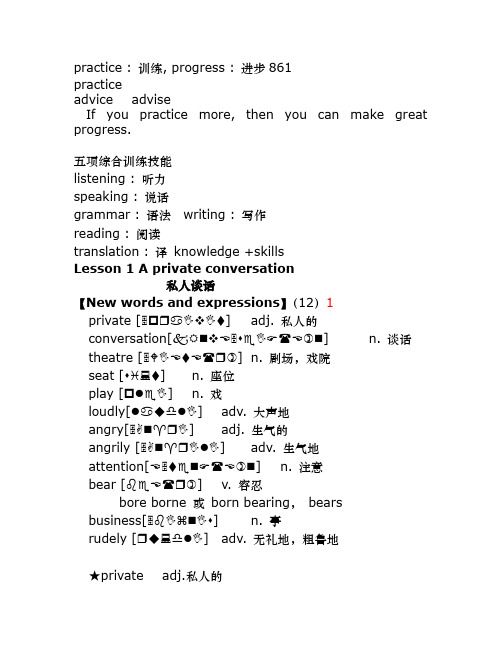
practice : 训练, progress : 进步861practiceadvice adviseIf you practice more, then you can make great progress.五项综合训练技能listening : 听力speaking : 说话grammar : 语法writing : 写作reading : 阅读translation : 译knowledge +skillsLesson 1 A private conversation私人谈话【New words and expressions】(12)1private [ ☐❒♋✋✋♦] adj. 私人的conversation[ ⏹☜♦♏✋☞☎☜✆⏹] n. 谈话theatre [ ✋☜♦☜☎❒✆] n. 剧场,戏院seat [♦♓♦] n. 座位play [☐●♏✋] n. 戏loudly[●♋◆♎●✋] adv. 大声地angry[ ✌⏹♈❒✋] adj. 生气的angrily [ ✌⏹♈❒✋●✋] adv. 生气地attention[☜♦♏⏹☞☎☜✆⏹] n. 注意bear [♌♏☜☎❒✆] v. 容忍bore borne 或born bearing,bearsbusiness[ ♌✋⏹✋♦] n. 事rudely [❒◆♎●✋] adv. 无礼地,粗鲁地★private adj.私人的①adj. 私人的private life 私生活private school 私立学校It's my private letter. (如果妈妈想看你的信)It's my private house. (如果陌生人想进你的房子)②adj. 普通的private citizen 普通公民I‟m a private citizen. (citizen n. 公民)③ n.士兵;二等兵.美国陆军或海军陆战队的非士官军衔,低于一等兵private soldier 大兵《Private Ryan》(《拯救大兵瑞恩》)public adj. 公众的,公开的(private的反义词)public school 公立学校public letter 公开信public place 公共场所privacy n.隐私It‟s privacy. 这是我的隐私!(不愿让别人知道的) Private adj. 1. 个人的,私人的= personale.g. a private care.g. a private garden2. 私营的,私立的e.g. New Oriental School is a private school.反义词:public adj. 公开的,公立的e.g. a public letter; a public placein private 私下里,单独地对应:in public 公开地e.g. She wanted to talk to me in private rather than in public.[script]Rachel: Ross, could I talk to you in private?Ross: Sure, you want to go upstairs?★conversation n.谈话have a + talk/chat/dialogue/conversation/gossip 名词变动词conversation 一般用于正式文体中, 内容上往往不正式subject of conversation 话题They are having a conversation.talk 内容可正式可不正式, 也可以私人Let‟s have a talk.dialogue[ ♎♋♓☜●♈] 对话, 可以指正式国家与国家会谈China and Korea are having a dialogue.chat[♦☞✌♦]闲聊,就是北京人说的“侃”,说的是无关紧要的事。
新概念英语第二册Lesson1课件
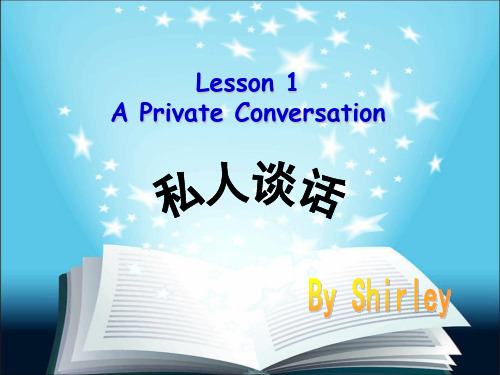
I could not hear the actors.
Key structures and usage
过去进行时:过去某个时间正在进行 或发生的动作 A young and a young woman were sitting behind me.
They were talking loudly.
• • • • • • • • • • • • • • •
【Key structures】 简单陈述句的语序 陈述句一定是有主语,有动词,有宾语,有句号 6 1 2 3 4 5 6 when? Who? Action Who? How? Where? When? Which? Which? What? What? 1 ---主语,一般由名词、代词或名词短语构成,通常位于动词之前,动词必 须与主语一致,即主语决定动词的单复数形式 2 ---谓语,由动词充当 3 ---宾语,一般为名词、代词或名词短语 4 ---副词或介词短语,对方式或状态提问,往往做状语 I like her very much 5 ---地点状语,一般在方式副词之后,时间副词之前 6 ---时间状语,可以放在句首或句末 简单陈述句一定不能少的是主语, 谓语. 如果问何时何地,是一个固定搭配 when and where
• • • • • •
★business n. 事, 生意 ① n. 生意 business man :生意人 do business: 做生意 ② n. 某人自己的私人的事情 It's my business. (指私人的事, 自己处理的 事) • It's none of your business. 不关你的事。
Language points
以下短语中名词前不加冠词:
新概念英语(第二册第1课讲解)
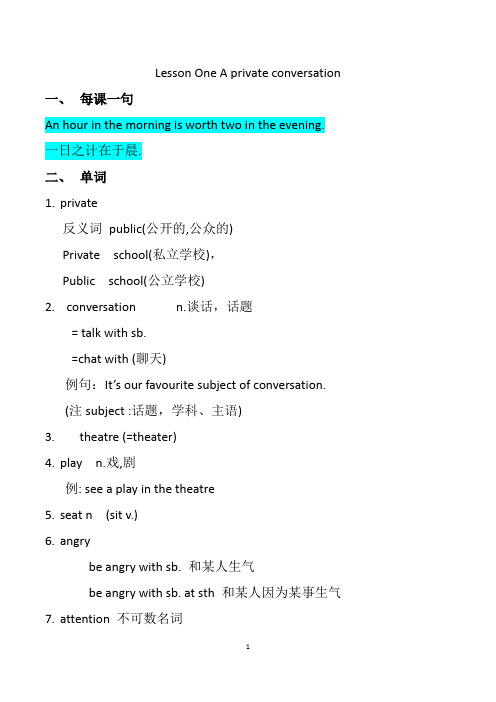
Lesson One A private conversation 一、每课一句An hour in the morning is worth two in the evening.一日之计在于晨.二、单词1.private反义词public(公开的,公众的)Private school(私立学校),Public school(公立学校)2.conversation n.谈话,话题= talk with sb.=chat with (聊天)例句:It’s our favourite subject of conversation.(注subject :话题,学科、主语)3.theatre (=theater)4.play n.戏,剧例: see a play in the theatre5.seat n (sit v.)6.angrybe angry with sb. 和某人生气be angry with sb. at sth 和某人因为某事生气7.attention 不可数名词pay attention to n./doing 注意做某事pay no attention to n./doing 一点都没注意pay much attention to n./doing 多加留心,多注意8.bear n.熊v.容忍(bore ,borne)类似单词:beer(啤酒),dear(亲爱的)同义词:stand(容忍),(stood,stood)stand doing sth 容忍做某事例句: I can’t stand it. 我一点不喜欢.9.business(ness名词后缀) 事;商业;生意business man商人; business woman 女商人10.k ey n.钥匙the key to the door键盘keyboard答案the key to the question = the answer to the question 关键的,重点的key school 重点学校11.r ude adj.无礼的反义词:polite; 近义词: impolite(p 开头的词,否定前缀im) Be rude to sb. 对…无礼Be friendly to sb. 对…友好Be polite to sb. 对…有礼貌注:否定前缀就当没看见,含有否定前缀的不是否定词。
新概念英语第二册 lesson 1

lesson 1 A private conversationLesson 1 A private conversation课文内容:Last week I went to the theatre. I had a very good seat. The play was very interesting. I did not enjoy it. A young man and a young woman were sitting behind me. They were talking loudly. I got very angry. I could not hear the actors. I turned round. I looked at the man and the woman angrily. They did not pay any attention. In the end, I could not bear it. I turned round again. ‘I can't hear a word!’ I said angrily.‘It's none of your business, ’ the young man said rudely. ‘This is a private conversation!’Notes on the text 课文注释1 go to the theatre,去看戏。
2 got angry,生气。
3 turn round,转身,也可用turn around。
4 pay attention,注意。
5 I could not bear it.我无法忍受。
其中的it是指上文中的那对男女大声说话又不理会作者的愤怒目光。
6 none of your business,不关你的事。
参考译文:上星期我去看戏。
我的座位很好,戏很有意思,但我却无法欣赏。
新概念第二册1-10课文
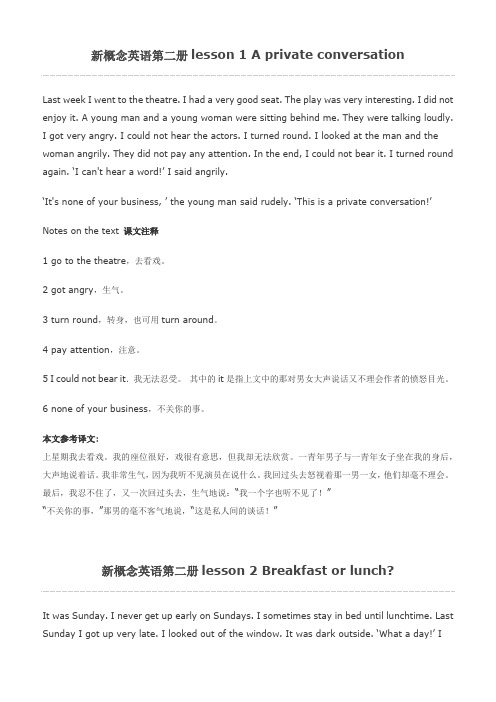
新概念英语第二册 lesson 1 A private conversationLast week I went to the theatre. I had a very good seat. The play was very interesting. I did not enjoy it. A young man and a young woman were sitting behind me. They were talking loudly. I got very angry. I could not hear the actors. I turned round. I looked at the man and the woman angrily. They did not pay any attention. In the end, I could not bear it. I turned round again. „I can't hear a word!‟ I said angrily. „It's none of your business, ‟ the young man said rudely. „This is a private conversation!‟ Notes on the text 课文注释 1 go to the theatre,去看戏。
2 got angry,生气。
3 turn round,转身,也可用 turn around。
4 pay attention,注意。
5 I could not bear it.我无法忍受。
其中的 it 是指上文中的那对男女大声说话又不理会作者的愤怒目光。
6 none of your business,不关你的事。
本文参考译文: 上星期我去看戏。
我的座位很好,戏很有意思,但我却无法欣赏。
一青年男子与一青年女子坐在我的身后, 大声地说着话。
新概念英语第二册第一课课文及翻译

新概念英语第二册第一课课文及翻译(总1页)-本页仅作为预览文档封面,使用时请删除本页-新概念英语第二册第一课课文及翻译【Text】 Last week I went to the theatre. I had a very good seat. The play was very interesting. I did not enjoy it. A young man and a young woman were sitting behind me. They were talking loudly. I got very angry. I could not hear the actors. I turned round. I looked at the man and the woman angrily. They did not pay any attention. In the end, I could not bear it. I turned round again. "I can't hear a word!" I said angrily. "It's none of your business," the young man said rudely. "This is a private conversation!"参考译文:上星期我去看戏. 我的座位很好, 戏很有意思, 但我却无法欣赏. 一青年男子与一青年女子坐在我的身后, 大声地说着话. 我非常生气, 因为我听不见演员在说什么. 我回过头去怒视着那一男一女, 他们却毫不理会. 最后, 我忍不住了, 又一次回过头去, 生气地说 : “我一个字也听不见了!”“不关你的事, “那男的毫不客气地说, “这是私人间的谈话!”2。
新概念英语第二册课文讲解 lesson1
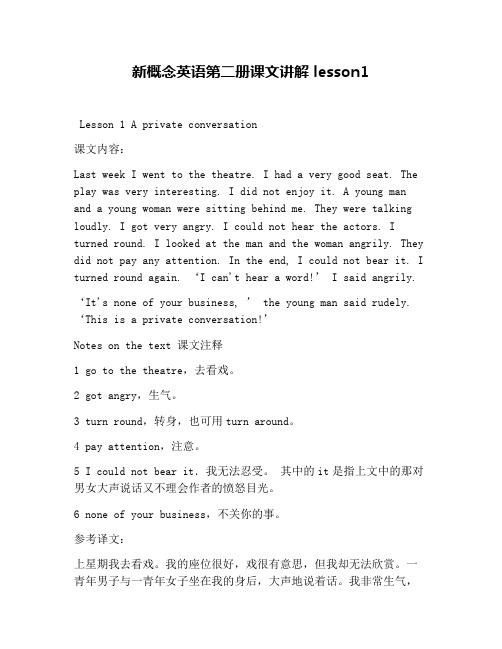
新概念英语第二册课文讲解 lesson1Lesson 1 A private conversation课文内容:Last week I went to the theatre. I had a very good seat. The play was very interesting. I did not enjoy it. A young man and a young woman were sitting behind me. They were talking loudly. I got very angry. I could not hear the actors. I turned round. I looked at the man and the woman angrily. They did not pay any attention. In the end, I could not bear it. I turned round again. ‘I can't hear a word!’ I said angrily.‘It's none of your business, ’ the young man said rudely. ‘This is a private conversation!’Notes on the text 课文注释1 go to the theatre,去看戏。
2 got angry,生气。
3 turn round,转身,也可用turn around。
4 pay attention,注意。
5 I could not bear it.我无法忍受。
其中的it是指上文中的那对男女大声说话又不理会作者的愤怒目光。
6 none of your business,不关你的事。
参考译文:上星期我去看戏。
我的座位很好,戏很有意思,但我却无法欣赏。
一青年男子与一青年女子坐在我的身后,大声地说着话。
新概念英语二 第一课 第一课时
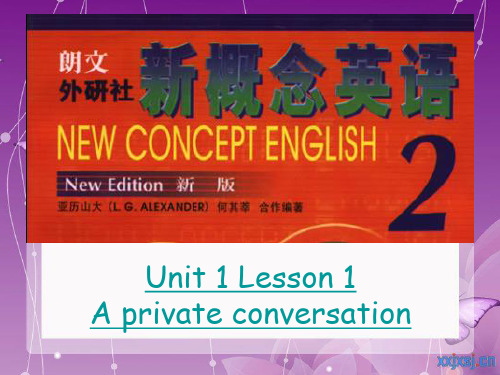
Listening
• Listen to the story and see if you can answer this question: Why did the writer complain to the people behind him? Because they were talking so that he could not hear the actors.
6.Could you hear what the actors were saying? •They were talking loudly. 7.Why couldn't you hear? •Talking loudly. 8.What were they doing? 9.Did you get angry with them or not? •Yes, I did.
Asking questions
5.Ask me if I turned round. Did you turn round? What...do? What did you do? 6. Ask me if I looked at the young man and the young woman angrily. Did you look at the young man and the young woman angrily? How...? How did you look at the young man and the young woman?
新概念第二册Lesson1课件PPT
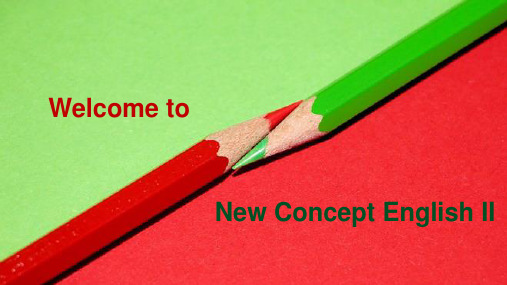
eg. win/lose a seat
2) vt. 安排….坐下; 使…就座
seat yourself. 你请坐。 Be seated, please. 请坐。 Sit down, please. Will you have a seat? Would you have a seat?
pay some attention to sth pay more attention to sth pay close attention to sth pay great attention to sth pay enough attention to sth pay little attention to sth pay no attention to sth.. 毫不在意
★ loud – adj. 大声的
1) adv. loudly adv. aloud
eg. She called loudly for help. = She called aloud for help.
think aloud 自言自语
★ attention – n. 注意
pay attention to sth
New words and expressions
★private - adj.
1) 私人的 (personal ) a private teacher a private car a private school private affairs eg. That is for your private ear. 这是说给你一个人的秘密。
新概念英语第二册Lesson1~3课文注释
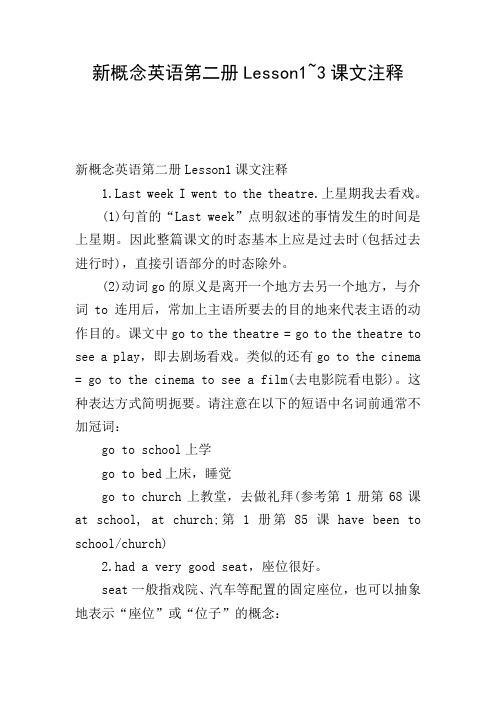
新概念英语第二册Lesson1~3课文注释新概念英语第二册Lesson1课文注释st week I went to the theatre.上星期我去看戏。
(1)句首的“Last week”点明叙述的事情发生的时间是上星期。
因此整篇课文的时态基本上应是过去时(包括过去进行时),直接引语部分的时态除外。
(2)动词go的原义是离开一个地方去另一个地方,与介词to连用后,常加上主语所要去的目的地来代表主语的动作目的。
课文中go to the theatre = go to the theatre to see a play,即去剧场看戏。
类似的还有go to the cinema = go to the cinema to see a film(去电影院看电影)。
这种表达方式简明扼要。
请注意在以下的短语中名词前通常不加冠词:go to school上学go to bed上床,睡觉go to church上教堂,去做礼拜(参考第1册第68课at school, at church;第1册第85课have been to school/church)2.had a very good seat,座位很好。
seat一般指戏院、汽车等配置的固定座位,也可以抽象地表示“座位”或“位子”的概念:the front seat of a car汽车的前座Take a seat, please.请坐。
3.The play was very interesting. 戏很有意思。
interesting属于现在分词形式的形容词,意思是“使人感兴趣”。
它通常与非人称主语连用或修饰某个事物:This is an interesting book/idea.这是一本有趣的书/一个令人感兴趣的主意。
4.…were sitting behind me. They were talking loudly. …坐在我的身后,大声地说着话。
新概念英语第二册第一课.ppt

新概念 第二册
PRACTICE & PROGRESS
实践与进步
Lesson 1 内容△步骤
First:介绍自己
Second: 单词学习
Fifth: 作业
本课内容
Fourth:
时态练习
Third: 课文讲解
New words & Expressions
private adj. 私人的
angry adj. 生气的
不注意 有点注意 密切注意 更多注意
10. bear v. 容忍
eg. I can't bear it. 我受不了了。 stand=put up with=bear 都可以表示容忍
bear n. 熊 a big black bear 一头大黑熊
11. business n. 事
12. rudely adv. 粗鲁地
14. she, draws, beautifully 15. music, I, like, very much 16. A new school, built, they, in our village,
last year 17. the match, at four o’clock, ended 18. she, a letter from her brother, last
新概念英语第二册第一课(包含课文、练习及答案)
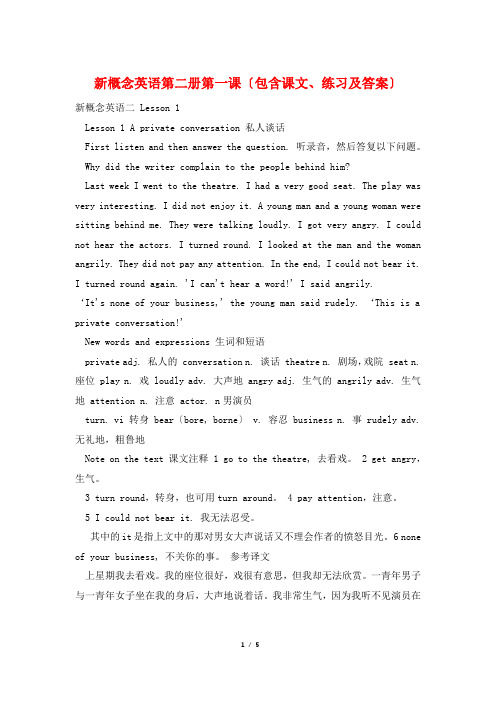
新概念英语第二册第一课〔包含课文、练习及答案〕新概念英语二 Lesson 1Lesson 1 A private conversation 私人谈话First listen and then answer the question. 听录音,然后答复以下问题。
Why did the writer complain to the people behind him?Last week I went to the theatre. I had a very good seat. The play was very interesting. I did not enjoy it. A young man and a young woman were sitting behind me. They were talking loudly. I got very angry. I could not hear the actors. I turned round. I looked at the man and the woman angrily. They did not pay any attention. In the end, I could not bear it.I turned round again. 'I can't hear a word!' I said angrily.‘It's none of your business,' the young man said rudely. ‘This is a private conversation!'New words and expressions 生词和短语private adj. 私人的 conversation n. 谈话 theatre n. 剧场,戏院 seat n. 座位 play n. 戏 loudly adv. 大声地 angry adj. 生气的 angrily adv. 生气地 attention n. 注意 actor. n男演员turn. vi 转身 bear〔bore, borne〕 v. 容忍 business n. 事 rudely adv. 无礼地,粗鲁地Note on the text 课文注释 1 go to the theatre, 去看戏。
- 1、下载文档前请自行甄别文档内容的完整性,平台不提供额外的编辑、内容补充、找答案等附加服务。
- 2、"仅部分预览"的文档,不可在线预览部分如存在完整性等问题,可反馈申请退款(可完整预览的文档不适用该条件!)。
- 3、如文档侵犯您的权益,请联系客服反馈,我们会尽快为您处理(人工客服工作时间:9:00-18:30)。
She loves to gossip to her neighbors.
她喜欢议论邻居们的是非长短。 gossip to sb. 讨论某人的是非
She's a terrible gossip. 她专爱说人闲话。
课文语言点详解
Last week, I went to the theatre.
常见搭配
pay attention 注意
pay attention to 对……注意
pay little/much/more/no attention
In the end, I could not bear it. I turned round again. 'I can't hear a word!' I said angrily. 'It's none of your business,' the young man said rudely. 'This is a private conversation!'. 最后,我忍不住了,又一次回过头去,生气地说:“我一个字也听 不见了!” “不关你的事,”那男的毫不客气地说,“这是私人间的谈话!”
☆ enjoy
enjoy oneself 玩得开心
enjoy+sth 喜欢(从中得到一种享受) (后面不能加人) I enjoy the music/book/dinner/film/program.
Enjoy后面的动词要用-ing
Enjoy doing sth 喜欢做某事 Enjoy swimming enjoy jogging
Talk with/to sb about sth
I had a long talk with the headmaster about my son. 关於我儿子的问题我与校长谈
了很长时间.
而作复数时则常指政治家之间在庄 重的场合中进行的严肃谈话:
to hold peace talks 举行和谈
angry adj. 生气的 angrily adv. 生气地 attention n. 注意 bear v. 容忍 business n. 事 rudely adv. 无礼地,粗鲁地
重点词汇详解与扩展
联想记忆,词汇倍增
☆private adj.私人的
如果妈妈想看你的信,你可以说: It's my private letter.
go to school 去上学; go to church 去做礼拜; go to hospital 去看病 go home 回家休息
[注]跟home相连一定表示没有事情可做,休闲
I had a very good seat.
考点:作为动词的seat与sit的区别 sit--vi; seat--vt seat sb 让某人就坐
angrily. They did not pay any attention. 我回过头去怒视着那一男一女,他们却毫不理 会。
turn round (around) 转身
turn away turn back
turn up turn down
turn in
turn off
turn to
turn out
I couldn't hear you. Beg your pardon?
I couldn't
Which judge will hear the case?
哪位法官(将)审理这案件?
扩展:hearing
1. 听力, 听觉
Her hearing is poor, ie She is
☆bear( bore, borne) v.
1. 容忍
I can't bear (having) cats in the house.
屋里有猫我可真受不了.
2. 支撑
The ice is too thin to bear your weight.
bear v. 忍受, 忍耐, 经得起〔主要用于否定句〕 it’s none of your business 不管你的事 private: 私生活 private life 家庭教师 private teacher 个人的事,私事 private business 这是私下只跟你一个人讲的 This is for your private ear.
When all those present___he began his lecture. A.sit B.set C.seated D.were seated
A改为sat就对了
☆seat n.座位
这个词很重要,考试常考。
1. have a good seat,这里的seat 指place,而不是chair。
I looked at the man and the woman angrily.
词汇辨析:see, watch, look, look at
1. see 看见(结果):
He looked for her but couldn't see her in the crowd. 他寻找她, 但
Seatbelt = safety belt 安全带
Fasten your seatbelt, please!
单词的具体到抽象:席位
Win a seat in the congress 赢得一个议会席位
Lose a seat in the congress 丢掉一个议会席位
I did not enjoy it.
去看戏
注意拼写规则: theatre (Br)= theater (US) centre = center metre = meter
☆go to the+地点:表示去某地 干特定某事
以下几种表达都是“看电影”的意思 go to the cinema Go to the film Go to the movies
新概念 第二册
PRACTICE & PROGRESS
实践与进步
课程特色
本课程强调五项综合技能训练
listening: 听力 speaking: 说话 reading : 阅读 writing :写作 translation :译
grammar 语法
本课程将结合中考系统讲授初 中语法知识
look at 看着 stare at 瞪眼看得…;瞪眼看 (带感情色彩)
pay attention (to) eg: My father pays special attention to my studies.
☆attention n.注意
Attention, please.
Ladies and gentlemen, may I have your attention, please?
dialogue
对白,对话
Most plays are written in dialogue.
大多数戏剧都是用对话体写的.
chat vi./ n.闲谈,聊天
就是北京人说的“侃大山”,说的是 无关紧要的事。
Chatting room 聊天室
gossip 嚼舌头,说长道短
gossip
进行大量的词汇扩展,使你的词 汇量倍增 在课堂上进行大量口语练习,系 统纠正发音,训练英语思维
大量的文化背景知识介绍
要求学生背诵每课课文
Lesson 1
A private conversation 私人谈话
生词和短语 words and expressions
private adj. 私人的 conversation n. 谈话 theatre n. 剧场,戏院 seat n. 座位 play n. 戏 loudly adv. 大声地
如果陌生人想进你的房子,你可以说: It's my private house.
词汇拓展: public
a.公众的;公共的;公开的 n.公众,民众
公立学校是public school
the public 公众; public letter 公开信; public place 公共场所
请区分以下几种谈话:
conversation 通常指亲切的交谈, 常 以交流思想或情况为目的:
Television has killed the art of conversation. 电视扼杀了交谈的艺术.
Talk
1. 可作可数名词, 通常指在普通场合 对少数人发表的简短讲话
talk with / to sb. = have a talk with sb
报纸的报道往往不尊重私人权利.
private还有一个值得注意的意思: 普通的
如:private citizen 普通公民; private soldier 大兵
拯救大兵瑞恩
☆conversation n.谈话
subject of conversation 话题 (天气是英国人最喜爱的话题)
瞧都什麽时候了! 十分钟前我们就该到戏院 了.
I can't hear a word!
a word 在此等于一句话
He didn't say a word.
口语中我们经常会说: May I speak to Jim? = May I
have a word with Jim?
I turned round. I looked at the man and the woman
I got very angry.
